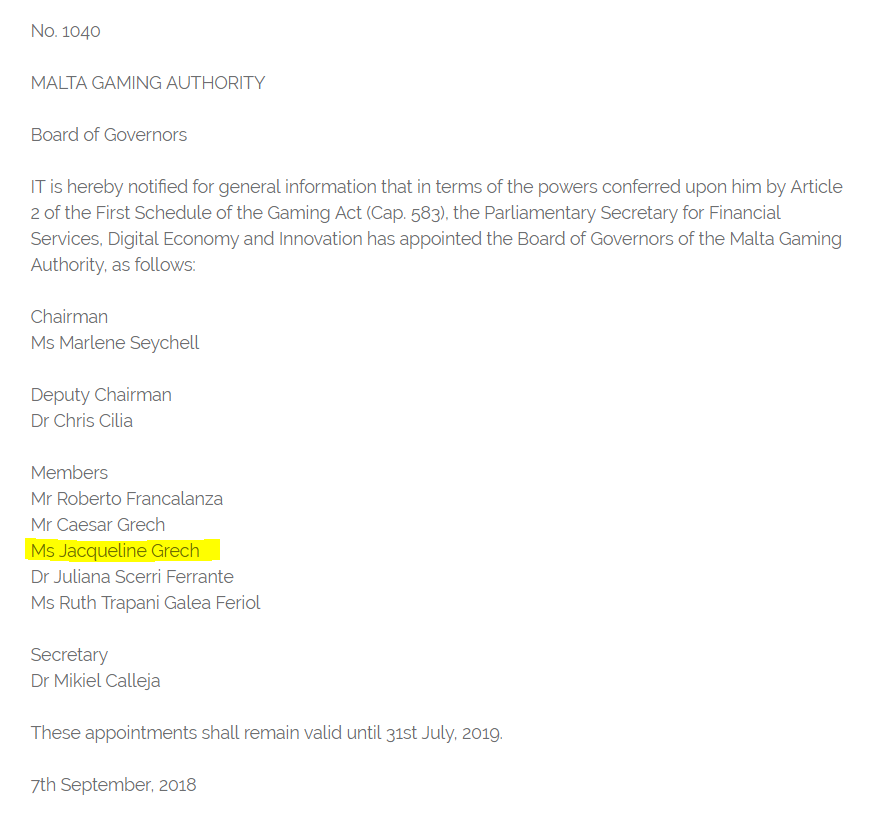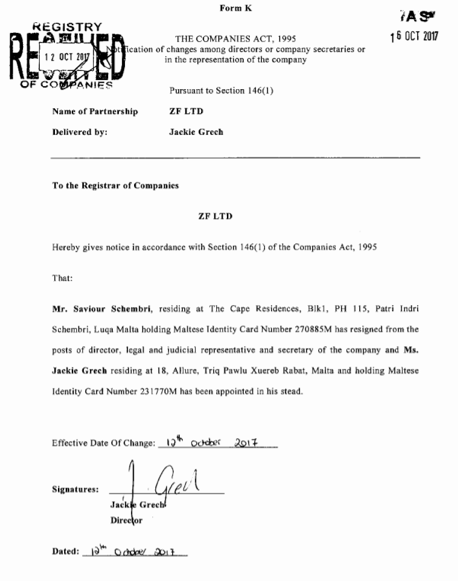Parliamentary Secretary Silvio Schembri has only ever filed two declarations as Parliamentary Secretary, but despite his recent entry into the political limelight his declarations show he has learned fast.
His income as Parliamentary Secretary doubled from 2017 (€33,895) to 2018 (€60,796). And it seems he ‘forgot’ to include his University of Malta honoraria as a visiting lecturer at the Department of Economics in his asset declarations.
As Parliamentary Secretary responsible for financial services, cryptocurrency, gaming and the prevention of money laundering, Schembri should be setting the example on transparency. Yet it seems he does not like to explain himself too much. He even refused to explain whether he had used taxpayers’ money to fund a 32-page colour booklet, estimated to cost at least €5,000, to promote his achievements with constituents last year.
The scant details provided in the asset declarations of Ministers and Parliamentary Secretaries makes it close to impossible to determine the real value of assets across the board. A probe of the declarations of assets over seven years conducted by The Shift News showed much was hidden behind what was said.
The “investments” section is the most notable part of Schembri’s two declarations for 2017 and 2018. He lists a number in brackets after each of the line items without any value sign, making it impossible to determine whether he is referring to euro values or bonds or shares held.

This is not a minor omission. The difference in value is a portfolio of investments worth over €20,000 vs another worth over €2 million (according to prices in early July).
Schembri also lists ownership of a company he acquired in 2017, according to documents submitted in parliament.
In 2008, when the Labour Party was still in opposition, Chris Cardona had said that if the Party was elected, “everyone in the Labour Party would have to dispose of commercial ties, this is a commitment we all made”.
Cardona himself ignored that commitment, retaining his shareholding in a development company with his former chief of staff while taking over the sole directorship of a company owned by the Labour Party in 2016 that has ignored MFSA rules to file audited accounts for eight years.
The company that Schembri declares he’s owned in full since 2017 is listed as ‘ZF Limited’. Previous media reports interpreted the scrawl as ‘2F’, but no company linked to Schembri exists under that name.
Hunting for Schembri’s company did reveal that the Commissioner for Public Standards, George Hyzler, remains listed as involved in a company with a similar name, despite his commitment to resign from all commercial roles.

ZF Limited was registered in April 2017 (C 80459) with Schembri as the sole shareholder and director. In October 2017, three months after being appointed parliamentary secretary, Schembri stepped down as director but retained full ownership. Jackie Grech, a partner in Charles Scerri & Associates, was appointed as sole director in his place. Schembri then appointed her to the Board of Governors of the Malta Gaming Authority.
 Charles Scerri & Associates, now CSA Group, has grown dramatically in recent years, from a small audit and accounting firm to a multi-disciplinary firm, particularly active in the Blockchain space, which happens to be Schembri’s area.
Charles Scerri & Associates, now CSA Group, has grown dramatically in recent years, from a small audit and accounting firm to a multi-disciplinary firm, particularly active in the Blockchain space, which happens to be Schembri’s area.
 Since ZF Limited has only ever filed audited accounts until the end of December 2017, at which point it had not yet started trading, it is not clear what the company does or owns. According to corporate documents, the aim of the company is primarily to “acquire, develop and lease movable and immovable property” but it also includes the production of adverts, brokerage and advisory services.
Since ZF Limited has only ever filed audited accounts until the end of December 2017, at which point it had not yet started trading, it is not clear what the company does or owns. According to corporate documents, the aim of the company is primarily to “acquire, develop and lease movable and immovable property” but it also includes the production of adverts, brokerage and advisory services.
Schembri’s assets declaration as Parliamentary Secretary differs from what he declares as a Member of Parliament, although the contents should be identical. There is no explanation offered.

Schembri chose to send out flowers to constituents on Mother’s Day – once again, he had not explained whether taxpayers footed the bill.
In 2018, The Malta Independent had reported that Silvio Schembri “declared an office in Luqa, as well as an apartment through a loan [and] €101,000 in savings” in his declaration of assets for the previous year.
While the apartment in Luqa is declared in his 2017 declaration and his declared savings are only €5,500 short of that figure, the office in Luqa is missing. It’s unclear whether this was since transferred to the company or simply omitted.
The requirement for MPs and, more importantly, Cabinet members to make and publish asset declarations is an essential tool in a democracy to prevent corruption by helping to detect unjustified variations in wealth as well as to spotlight conflicts of interest.
The European Court of Human Rights has held that the public’s legitimate interest to ensure transparency in politics, through the mandatory publication of comprehensive (and accurate) asset declarations, far outweighs rights to privacy.













